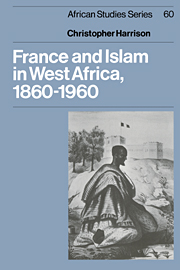Book contents
- Frontmatter
- Contents
- Acknowledgements
- Abbreviations
- Map
- 1 Introduction
- PART I 1850–1898: NINETEENTH-CENTURY ORIGINS OF FRENCH ISLAMIC POLICY
- PART II 1898–1912: THE FEAR OF ISLAM
- PART III FRENCH SCHOLARSHIP AND THE DEFINITION OF ISLAM NOIR
- PART IV 1920–1940: THE FRENCH STAKE IN ISLAM NOIR
- Introduction
- 8 Post-war attitudes to Islam
- 9 The French stake in Islam
- 10 The ‘rediscovery’ of Islam
- 11 Epilogue 1940–1960
- 12 Conclusion
- Notes
- Bibliography
- Index
9 - The French stake in Islam
Published online by Cambridge University Press: 01 February 2010
- Frontmatter
- Contents
- Acknowledgements
- Abbreviations
- Map
- 1 Introduction
- PART I 1850–1898: NINETEENTH-CENTURY ORIGINS OF FRENCH ISLAMIC POLICY
- PART II 1898–1912: THE FEAR OF ISLAM
- PART III FRENCH SCHOLARSHIP AND THE DEFINITION OF ISLAM NOIR
- PART IV 1920–1940: THE FRENCH STAKE IN ISLAM NOIR
- Introduction
- 8 Post-war attitudes to Islam
- 9 The French stake in Islam
- 10 The ‘rediscovery’ of Islam
- 11 Epilogue 1940–1960
- 12 Conclusion
- Notes
- Bibliography
- Index
Summary
André does not appear to have had any successor as advisor on Islamic affairs to the Governor-General until 1943 when Henri Martin, the first of a succession of graduates from the Centre des hautes études d'administration musulmane (CHEAM) was appointed to the newly created Bureau des affaires musulmanes in Dakar. Indeed, on the whole, the French administration in Dakar during the 1920s and 1930s saw less cause for alarm in Islam than they had done in previous eras. The same could not be said of the Colonial Ministry in Paris which watched events in the Middle East with considerable apprehension. The optimism of Paris' hopes for an alliance with Turkey soon gave way to traditional fears about nationalism. In October 1923 the Colonial Minister wrote to Governor-General Carde in Dakar with a warning about nationalism in the Middle East:
The Muslim world such as it has appeared throughout the centuries with its rigid fanaticism, its theocratic basis, its explosion of mahdism, its cult of saints and the influence of religious congregations seems to be wanting hence-forward to evolve towards new destinies under the impulsion of a superficially secular ruling class.
The leaders of the neo-nationalism have perfected the theory of pan-Islamism. They have used it to give a sense of direction to the vaguely formulated wishes for a renaissance in Islam as a reaction against Western domination.
- Type
- Chapter
- Information
- France and Islam in West Africa, 1860–1960 , pp. 164 - 182Publisher: Cambridge University PressPrint publication year: 1988

